|
All Global Research articles can be read in 51 languages by activating the “Translate Website” drop down menu on the top banner of our home page (Desktop version).
Visit and follow us on Instagram at @crg_globalresearch.
***
As the First World War was erupting from late summer 1914, the great majority of political leaders believed it would be of short duration.
Only the rare far-sighted individual knew what was coming, such as Herbert Kitchener, Britain’s Secretary of War. At one of the first British Cabinet conferences at the conflict’s outset, Kitchener predicted the fighting would rumble on for three years, and that Britain would eventually be required to deploy its full resources (1). His estimation of a three-year war was shy of just one year.
Edward Grey, the British Foreign Secretary, recalled that Kitchener’s prediction had “seemed to most of us unlikely, if not incredible” (2). On 8 August 1914 Winston Churchill, the First Lord of the Admiralty, estimated that the war would last for nine months, which was longer than many thought.
Kitchener’s colleagues failed to realise, such was mankind’s advancements in technology by the early 20th century – about 150 years after the Industrial Revolution had begun in Britain around 1760 – that a war between the great powers would most likely be lengthy, and a slaughter of unprecedented proportions could only ensue. After the bloodletting finally stopped on 11 November 1918, realistic analysts like Vladimir Lenin stated that the waging of war was “a survival from the bourgeois world”; while the German commander Hans von Seeckt said “war was no longer an intelligent way to conduct a nation’s policy”. (3)
The rise to power in Italy and Germany of fervent warmongers, Benito Mussolini and Adolf Hitler, was a near guarantee that another large-scale conflict was in the offing.
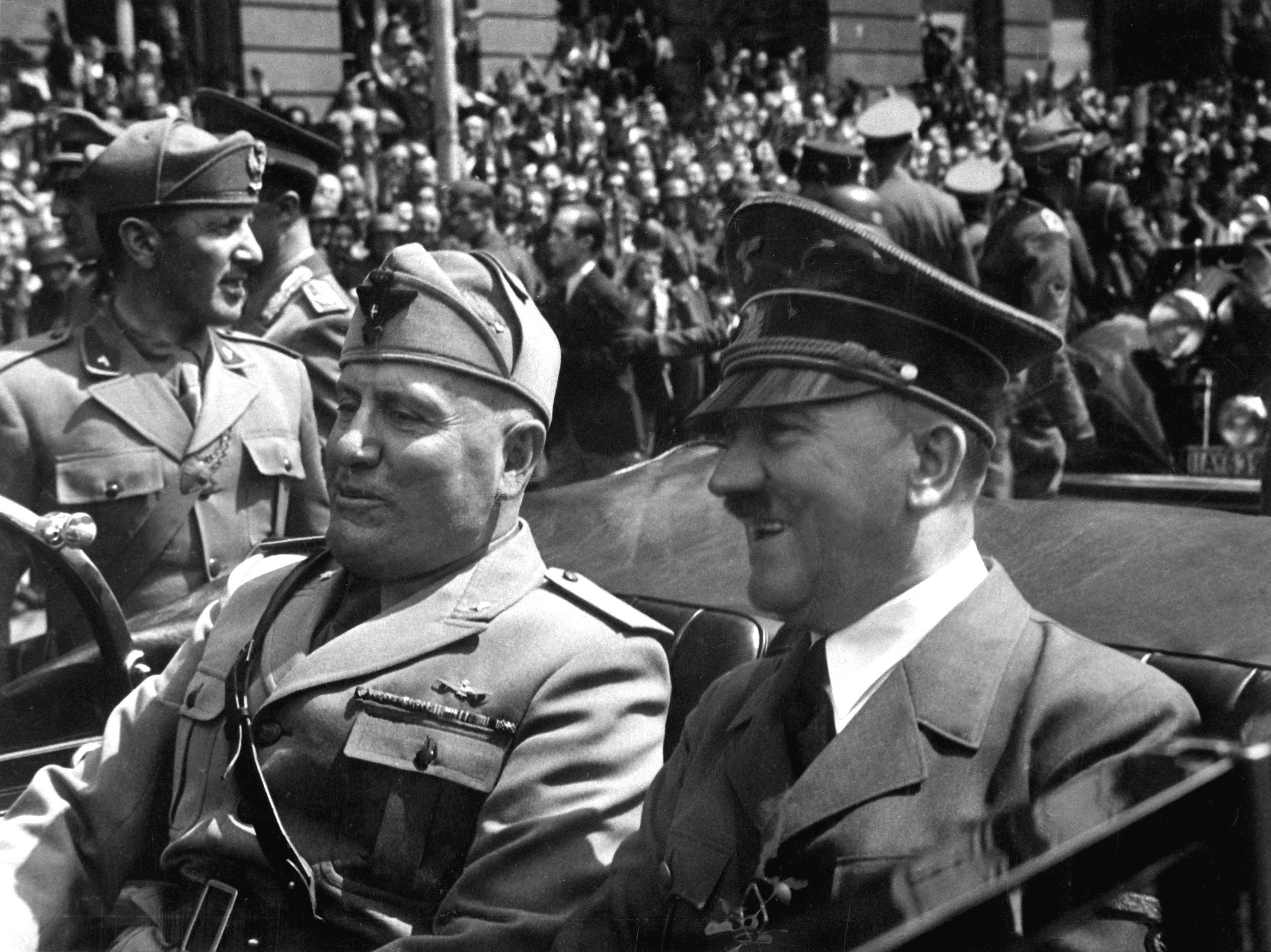
Both Mussolini and Hitler’s taking of power, in 1922 and 1933 respectively, was assisted massively by the social upheaval and destabilisation induced as a result of World War I.
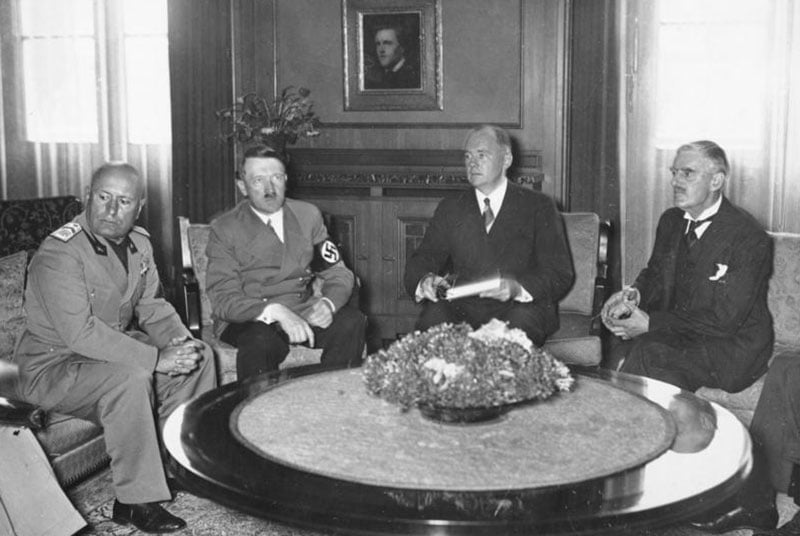
Neville Chamberlain, Adolph Hitler and Benito Mussolini Meet in 1938
The weak-willed response of the western democracies to Nazi enlargement from the mid-1930s, particularly the timid French reaction, emboldened Hitler on the path to war. British professor Evan Mawdsley, who specialises in Russian history, wrote of the Third Reich’s position by 1941 that “invading Russia was not the fatal mistake of Nazi Germany. After all, what was Hitler’s alternative? Not to invade Russia? Inaction would have allowed Germany’s enemies to become stronger, and would have left Germany economically dependent on Russia. The lethal mistake had been made earlier, when Hitler’s adventures in Czechoslovakia and Poland led Germany into a general war”. (4)
The fighting initially went as well as the Wehrmacht could have hoped for; they routed Poland in September 1939 and then scored further routine victories in Scandinavia and across western Europe, during the spring and summer of 1940. The principal opposing force, the French Army, had been decaying ever since 1917. That year mutinies spread to no less than 54 French divisions by 9 June 1917. Even in those formations where no mutinies occurred, over 50% of French soldiers returning from leave reported back drunk (5). These amazing occurrences were hushed up as best they could by the French military command, and the silence needlessly continued long afterwards.
Canadian historian Donald J. Goodspeed explained,
“Shame and pride are bad counselors, and the causes of the catastrophe in French morale that occurred in 1917 were never brought out into full daylight, where they could have been analysed and perhaps cured. That no real cure was effected, the debacle of 1940 conclusively proved”. (6)
The Nazis now turned their attention to the main target of their imperialist foreign policy: the Soviet Union, which Hitler had envisaged conquering for many years. Hitler was given encouragement by the Soviet Army’s underwhelming performance, in the 1939-1940 Winter War against Finland, with its population of around 4 million.
Yet as the Finns’ leading commander Gustaf Mannerheim fairly concluded, the Soviets learnt lessons from their opening military shortcomings on Finnish soil, and their performance “slowly improved” as the weeks elapsed (7). The gradual uptake in Russia’s military display here was unknown to the few German military observers, who had accompanied the Red Army on their Finnish incursion. The Germans were left unimpressed by the first Soviet raids, before departing homeward early.
The Wehrmacht meanwhile enjoyed more swift triumphs, over Yugoslavia and Greece in April 1941, which only emboldened Hitler further. The German conquest of Yugoslavia and Greece compelled Hitler to postpone his invasion of the USSR by 38 days. This delay is often purported to be a crucial reason, in the Nazis’ failure to capture Moscow and overthrow the Soviet Union.
American military historian Samuel W. Mitcham, who focuses largely on the Nazi regime, revealed otherwise as “the spring rains in eastern Poland and the western sections of European Russia came late in 1941, and were much heavier than usual. Many of the Polish-Russian river valleys (including the Bug) were still flooded as late as June 1; therefore, the invasion of the Soviet Union could not have begun until after that”. (8)
 The ground in the western USSR had dried out by 22 June 1941. It was ideal for the panzers, half-tracks, and so on to move with ease. In addition, for weeks Joseph Stalin had refused to believe the swell of intelligence accounts he received in person from his own agencies, and from abroad, warning of a coming German attack. The ground in the western USSR had dried out by 22 June 1941. It was ideal for the panzers, half-tracks, and so on to move with ease. In addition, for weeks Joseph Stalin had refused to believe the swell of intelligence accounts he received in person from his own agencies, and from abroad, warning of a coming German attack.
Lt. Col. Goodspeed wrote,
“The reports from Soviet intelligence were the most plausible, accurate and detailed of all; and they displayed a remarkable convergence, which should have augmented their credibility. Victor Sukolov, the head of the Rote Kopelle [Red Orchestra] in Brussels, Rudolph Rössler in Switzerland, Leopold Trepper in Paris, and Dr. Richard Sorge in Tokyo all informed Stalin of Barbarossa”. (9)
The Kremlin was clearly not expecting the German invasion to fall in the summer of 1941. Marshal Nikolay Voronov, a top level Russian commander in charge of the Red Army’s artillery forces, and a future Hero of the Soviet Union, remembered on the eve of Hitler’s attack, “I did not know in that time whether we had any kind of operative-strategic plan, in case of war. I only knew that the plan for artillery and combat artillery tactics had not yet been approved, although the first draft had been worked out in 1938”. (10)
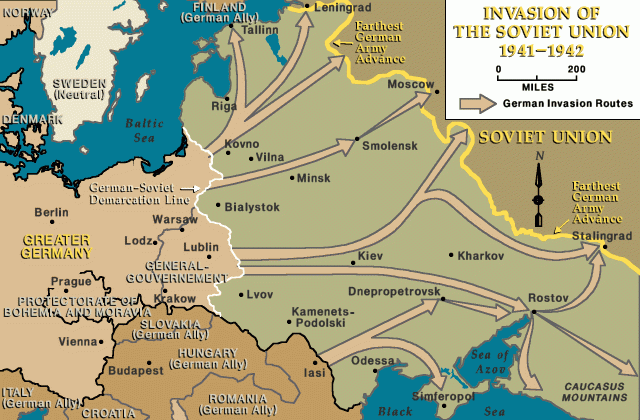
Further evidence of the lack of Russian preparedness was seen when, in the opening phase of the invasion, large numbers of Soviet airplanes were destroyed by the Germans, much of them on the ground. Air units of the Soviet Western Military District lost 740 of its 1,540 aircraft (a 48% loss) on the first day alone of the German attack (11); its local commander, General Ivan Kopets, viewed the destruction with despair and shot himself on 23 June 1941.
The ruin of the Soviet Air Force was even worse in the Baltic Military District. During the first three days of Operation Barbarossa, 920 Soviet aircraft out of a total of 1,080 were destroyed in the Baltic region, an 85% loss (12). Furthermore, many undamaged and repairable Russian planes had to be abandoned, as the Germans and their Axis allies (mainly Romanians and Finns at first) swarmed over Soviet terrain. By the first week of July 1941, the Soviets had lost almost 4,000 aircraft, while the Luftwaffe was shorn of just 550 of its planes at that point. (13)
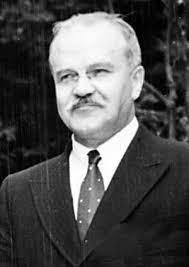 Stalin had been awoken by his security chief, Nikolai Vlasik, in the early hours of 22 June 1941, and he was told of heavy German shelling along the Nazi-Soviet frontier. Stalin at first refused to believe that the worst had occurred and he said, “Hitler surely doesn’t know about it” (14). Later in the morning of 22 June, Stalin ordered the Soviet foreign minister Vyacheslav Molotov to seek out the German ambassador to the USSR, Friedrich von Schulenburg. The latter confirmed Nazi Germany’s declaration of war on the Soviet Union. Stalin had been awoken by his security chief, Nikolai Vlasik, in the early hours of 22 June 1941, and he was told of heavy German shelling along the Nazi-Soviet frontier. Stalin at first refused to believe that the worst had occurred and he said, “Hitler surely doesn’t know about it” (14). Later in the morning of 22 June, Stalin ordered the Soviet foreign minister Vyacheslav Molotov to seek out the German ambassador to the USSR, Friedrich von Schulenburg. The latter confirmed Nazi Germany’s declaration of war on the Soviet Union.
A dismayed Molotov (image left) reported back to Stalin,
“The German government has declared war on us”. Robert Service, the British historian of Soviet history, noted that upon hearing this, “Stalin slumped in his chair and an unbearable silence followed”. When General Georgy Zhukov then suggested they put in place measures, to hold up the German advance, Service wrote “Stalin continued to stipulate that Soviet ground forces should not infringe German territorial integrity”. (15)
Contrary to what is commonly claimed, on learning that the Germans had certainly attacked with Hitler’s agreement, Stalin did not suffer a breakdown and disappear. On 23 June 1941 for example, as Service wrote in his biography of the Soviet ruler, “Stalin worked without rest in his Kremlin office. For 15 hours at a stretch from 3.20 am, he consulted with the members of the Supreme Command” (16). As the hours went by Service writes that Stalin “called generals to his office, made his enquiries about the situation to the west of Moscow, and gave his instructions. About his supremacy there was no doubt”.
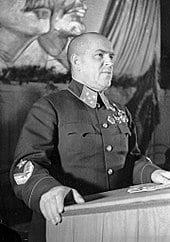 Only from the early morning of 29 June 1941 did Stalin suffer a relapse, and retire to his nearby dacha in a deeply depressed condition. This was quite probably a delayed reaction brought on by his difficult visit, on 27 June, to the Soviet Ministry of Defence. When Generals Zhukov and Semyon Timoshenko showed Stalin, on operational maps, the astonishing advancements made by the German Army, Service wrote that Stalin “was shocked by the extent of the disaster for the Red Army”. (17) Only from the early morning of 29 June 1941 did Stalin suffer a relapse, and retire to his nearby dacha in a deeply depressed condition. This was quite probably a delayed reaction brought on by his difficult visit, on 27 June, to the Soviet Ministry of Defence. When Generals Zhukov and Semyon Timoshenko showed Stalin, on operational maps, the astonishing advancements made by the German Army, Service wrote that Stalin “was shocked by the extent of the disaster for the Red Army”. (17)
General Zhukov (right)
By 27 June, units from German Army Group Centre had already reached Minsk, the capital of Soviet Belorussia, and less than 450 miles west of Moscow. Shaken and disturbed by this Stalin reportedly lamented, “Lenin founded our state and we’ve f**ked it up”. (18)
After Hitler had ordered the attack against Russia on 22 June, the authorities in Britain and America forecast another brisk German victory. Their views were influenced by the apparent invincibility of the Wehrmacht, their dislike of Bolshevism, and also Stalin’s recent purge of the Red Army. Outside observers mistakenly believed the purge had decimated Soviet fighting capacity. Mawdsley in his extensive study of the Nazi-Soviet war wrote, “Many able middle-level commanders survived the purges” while the “commanders and commissars who were shot made up a minority”. (19)
A major offensive in the modern era, perhaps in any age, constitutes a huge gamble on the part of the invader, brutal as these attacks usually are, and the Nazi invasion was the most vicious of all. Various factors can combine to result in its failure: strength of the invasion force, strategic errors, quality of the terrain, underestimation of the enemy, the weather, etc. These elements are magnified when attacking the world’s largest country (Russia), as Napoleon had discovered and soon Hitler too.
Nevertheless, there are a couple of overwhelming reasons why the German attack would fail. Firstly, Hitler did not place the German nation on a Total War footing, until February 1943, much too late. The Nazi economy in the early 1940s produced an “extraordinary degree of inefficiency and wastefulness”, the English historian Richard Overy discerned (20). It resulted in labour shortages, fewer German weapons, aircraft and panzers, and less soldiers, while German women for the most part remained at home, rather than working in the armament factories.
After the defeat of France, a full mobilisation of German manpower would have produced a Wehrmacht attacking force of about 6 million men in June 1941 (21). This is double the size of the 3 million German soldiers which invaded Russia that month. Taking into account strategic mistakes committed and heroic Russian resistance, a German invasion with 6 million troops would surely have been too much for the Soviets to contend with, and it was possible to achieve.
Albert Speer, German Minister of Armaments and Munitions from 1942-1945, wrote on 29 March 1947,
“In the middle of 1941, Hitler could easily have had an army equipped twice as powerfully as it was… We could even have mobilised approximately 3 million more men of the younger age-groups before 1942, without losses in production… 3 million additional soldiers would have added up to many divisions. These, moreover, could have been excellently equipped as a result of the increased production”. (22)
Another monumental error, on the part of the German high command and Hitler, was the strategic design for Operation Barbarossa. This consisted of splitting their forces into three large Army Groups, and ordering them to capture three different objectives simultaneously (Leningrad, Moscow and the Ukraine); rather than directing their resources towards easily the most important goal – Moscow, the communications stronghold and heartbeat of Soviet Russia, which will be discussed further here.
Lt. Col. Goodspeed, a skilled military strategist, wrote that,
“Although in operations and tactics the German Army had proved itself far and away superior to the Red Army, the same could not be said of German strategy. The fault was so simple and obvious that a child might have foreseen it. The German high command had attempted too many things at the same time”. (23)
The German attack was launched across almost the entire breadth of the western USSR. Its Schwerpunkt, that is the heavy point of the German blow, fell north of the famous Pripet Marshes in Belorussia. However, the Germans and their Axis allies were ordered to attack everywhere at once. The strategic planning for Barbarossa went beyond even the Wehrmacht’s military capabilities; it was breathtaking in its boldness, irresponsible and grotesque.
Goodspeed summarised,
“But Hitler wanted too much and, as a consequence, got nothing. This same fundamental error was repeated again and again. It recurs like a leitmotif in the Führer’s strategic thought. When the advance against Moscow might have been successfully resumed in August, and previous mistakes rectified, Hitler turned his thrust south into the Ukraine and north against Leningrad. Again, two objectives and both of them the wrong ones. When Leningrad might have been taken in September, Hitler diverted forces back from Army Group North to Moscow, and thereby captured neither Leningrad nor Moscow”. (24)
This viewpoint is supported by Mawdsley who pinpointed the “mistake that Hitler and his high command made in 1941” which was “to attack everywhere” (25). Hitler did not designate primary importance to Moscow, until it was weeks too late. The Russian capital held critical significance as the centre of Soviet communications, which was recognised by military leaders like Field Marshal Fedor von Bock, the commander of German Army Group Centre, which was supposed to capture Moscow (26). Virtually all roads and railways led to the capital, like spokes into the hub of a wheel.
This was not the case when Napoleon’s forces had occupied Moscow on 14 September 1812. Moscow at that time did not hold the same status, by comparison to its importance in the 20th century, when armies had become reliant on railways and motorised transport for supplies. The first railway line in Russia was built in 1837, a quarter of a century after Napoleon’s invasion.
Were Moscow to be captured in the autumn of 1941, the Russians would have had tremendous difficulty supplying and reinforcing their northern and southern fronts (27). This includes the Leningrad and Ukrainian sectors. The rail system of the western USSR would have been shattered, inflicting a hammer blow on the Soviet Army.
Goodspeed wrote that from Barbarossa’s outset,
“Quite conceivably, a single great thrust along the Warsaw-Smolensk-Moscow axis might have secured the Russian capital for the Germans by the end of August. Army Groups North and South could have acted as flank guards for such a thrust, and once the Russian centre had been demolished and the communications hub of Moscow taken, the Soviet northern and southern fronts would have been isolated from one another. Then a drive down the Volga in September might well have achieved a second victory, greater even than the Battle of Kiev. This done, Leningrad and the northern front could have been dealt with at leisure, and by another overwhelming concentration of force”. (28)
One major thrust towards Moscow would, also, have taken the ferocious Russian weather out of the equation. The autumn rains and snow arrived in force from early October 1941, weeks after Moscow could have been taken. As events panned out, such weather seriously slowed the German advance.
The political ramifications of Moscow’s capitulation would have been considerable too. Stalin and his entourage were headquartered there. What would Stalin have done had Moscow fallen to the Germans in August or September 1941? He may have decided to stay and thereby seal his fate, or he could have chosen to relocate to Asiatic Russia, where it would have been arduous to hold together a government.
Most importantly of all, as Germany’s generals were aware, the bulk of the Red Army was centred in front of Moscow for the defence of the capital. If these Russian divisions were to be surrounded in a vast pincers movement and forced to surrender, the war would have been practically over. (29)
Two months into the invasion, on 21 August 1941 Hitler fatefully intervened in the direction of the war, believing he would be proved right and the German generals wrong – as had been repeatedly the case on political matters. Hitler compounded Barbarossa’s early strategic mistakes by ordering on this date: “The most important objective to be taken before the coming of the winter is NOT the capture of Moscow, but the capture of the Crimea and of the industrial and coal-mining area of the Donets, and the cutting off of Russian oil supplies from the Caucasus; and to the north the investment of Leningrad and the linking up with the Finns”. (30)
Hitler’s Chief of Operations, General Alfred Jodl, defended this decision by claiming that Hitler wished to avoid the blunders of Napoleon (31). As mentioned earlier, Moscow was of much greater importance in the year 1941 as opposed to 1812. Hitler was greedy and saw too many things at once, rather than focusing on a single goal at a time (similar strategic errors were committed in July 1942, when Hitler split up his forces to capture two objectives simultaneously, Stalingrad and the Caucasus).
Hitler’s wish, to strike everywhere, could have been influenced too because of his desire to spread as much death and destruction to the Soviet Union as possible, which he believed was the homeland of “Jewish Bolshevism”.
Upon hearing the new orders of 21 August 1941, two days later General Heinz Guderian travelled west to Hitler’s headquarters, situated in the dense forests near Rastenburg, East Prussia. Guderian, commanding the 2nd Panzer Group, informed Hitler that the taking of Moscow would paralyse the Soviet transportation and communication networks; the general stressed the political significance of Moscow’s demise, and the huge lift it would provide to German morale. (32)
Moreover, Guderian insisted that the fall of the capital would make it easier to conquer other parts of the USSR, such as the Ukraine. Yet Hitler’s mind was firmly set and he told Guderian that his generals “know nothing of the economic aspects of war”. The orders were left unchanged.
Goodspeed observed,
“Thus, quietly, in a headquarters far from the sound of guns, Germany lost the war. The Führer directive of August 21, 1941, marked a great turning point in modern history. Many horrors were still to come, and mankind has by no means moved out from the darkness of these times, but at least the world was to be spared a Nazi victory”. (33)
General Franz Halder, Chief of Staff of the German Army High Command, stated that Hitler’s above directive was “decisive to the outcome of this campaign”. (34)
*
Note to readers: Please click the share buttons above or below. Follow us on Instagram, @crg_globalresearch. Forward this article to your email lists. Crosspost on your blog site, internet forums. etc.
Shane Quinn obtained an honors journalism degree. He is interested in writing primarily on foreign affairs, having been inspired by authors like Noam Chomsky. He is a frequent contributor to Global Research.
Notes
1 Peter Simkins, “Kitchener, Horatio Herbert Kitchener Earl”, 1914-1918-online, 29 March 2018
2 Paul Addison, Churchill on the Home Front, 1900-1955 (Faber and Faber; Main edition, 11 June 2013) Chapter 4, Two Faces of a Home Secretary, 1910-1911
3 Donald J. Goodspeed, The Conspirators: A Study of the Coup d’Etat (Macmillan, 1 January 1962), Intro., pp. x-xi
4 Evan Mawdsley, Thunder in the East, The Nazi-Soviet War, 1941-1945 (Hodder Arnold, 23 Feb. 2007) pp. 7-8
5 Donald J. Goodspeed, The German Wars (Random House Value Publishing, 2nd edition, 3 April 1985) p. 235
6 Ibid.
7 Oliver Warner, Marshal Mannerheim & The Finns (Weidenfeld & Nicolson, 1st Edition, 1 January 1967) p. 169
8 Samuel W. Mitcham, The Rise of the Wehrmacht: The German Armed Forces and World War II (Praeger Publishers Inc., 30 June 2008) p. 402
9 Goodspeed, The German Wars, p. 392
10 Harrison E. Salisbury, The 900 Days: The Siege of Leningrad (Da Capo Press, 30 Sep. 1985) p. 78
11 Mawdsley, Thunder in the East, p. 58
12 Ibid.
13 Ibid., p. 59
14 Robert Service, Stalin: A Biography (Pan; Reprints edition, 16 Apr. 2010) p. 410
15 Ibid., p. 411
16 Ibid., p. 413
17 Ibid., p. 414
18 Shane Kenny, “The Man Who Really Defeated Hitler”, Irish Times, 30 April 2005
19 Mawdsley, Thunder in the East, p. 21
20 Richard Overy, Goering: The Iron Man (Bloomsbury Academic, 2nd edition, 1 Oct. 2020) p. 169
21 Albert Speer, Spandau: The Secret Diaries (Fontana, London, 1977) p. 62
22 Ibid., pp. 62-63
23 Goodspeed, The German Wars, p. 403
24 Ibid., p. 404
25 Mawdsley, Thunder In The East, p. 128
26 Antony Beevor, The Second World War (Phoenix Press, 2013) p. 201
27 Goodspeed, The German Wars, p. 395
28 Ibid., pp. 403-404
29 Ibid., p. 396
30 Ibid.
31 Beevor, The Second World War, p. 201
32 Paul Schultz, The Führer Virus: A Tale of Espionage (Strategic Book Publishing & Rights Agency, LLC, 19 Nov. 2008) p. 313
33 Goodspeed, The German Wars, pp. 396-397
34 Andrew Roberts, The Storm of War: A New History of the Second World War (Allen Lane, 22 July 2009) Chapter 5, June-December 1941
|